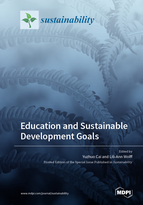Education and Sustainable Development Goals
A special issue of Sustainability (ISSN 2071-1050). This special issue belongs to the section "Sustainable Education and Approaches".
Deadline for manuscript submissions: closed (31 March 2022) | Viewed by 33104
Special Issue Editors
Interests: higher education policy and management; innovation studies; internationlisation of higher education
Special Issues, Collections and Topics in MDPI journals
Interests: environmental and sustainability education; transdisciplinary and phenomenon-based learning; transformative approaches; sustainable leadership; education in the Anhropocene
Special Issues, Collections and Topics in MDPI journals
Special Issue Information
Dear Colleagues,
This Special Issue on “Education and Sustainable Development Goals” for the journal of Sustainability targets papers presented and selected for publishing at the 6th Sino-Finnish Joint Learning Innovation Institute (JoLii) Annual Conference on 15–17 November 2021. Authors interested in contributing to this Special Issue are welcome to attend the conference (no registration fee) and submit paper abstracts by 31 July 2021. (See more on the conference website: https://events.tuni.fi/jolii2021/)
In 2015, the United Nations (UN) adopted the 2030 Agenda for Sustainable Development, providing a shared blueprint for peace and prosperity for people and the planet, now and in the future. The implementation of the blueprint is equivalent to achieving the 17 Sustainable Development Goals (SDGs) set by the UN’s 2030 Agenda. This blueprint has significant implications for education. In addition to SDG 4: Quality Education, education is also recognised as the key to success of the remaining SDGs (UNESCO, 2017). While the important relations between education and the SDGs are widely acknowledged, there remains ambiguity on how education can effectively contribute to the SDGs (Kioupi and Voulvoulis, 2019) as well as how education and educational institutions can transform to better adapt to the SDGs (Leal Filho et al., 2019).
The 6th JoLii conference invites education researchers from two countries, both with unique education systems. One country is China, which has the largest education system in the world, and the other is Finland, with one of the internationally best-performing education systems. We encourage researchers from (or with an interest in) these countries to share their insights and research findings related to education and sustainability. It is expected that the scholarly discussions at the conference will not only offer research-based knowledge to support education and the implementation of the SDGs in these countries but also help to address broader global challenges on the topic.
We welcome papers that contribute to the discussion from theoretical, methodological, or empirical perspectives. The papers may be relevant to educational researchers, policymakers, administrators, as well as professionals. The perspective may even be critical to the entire SDG approach. Specifically, we invite research contributions to the following tracks:
- The relations between education and sustainable development;
- The roles of education and educational institutions (including schools and universities) in the implementation of the SDGs;
- Transformative approaches to learning, education, and institutional performance in accordance with the SDGs;
- Global and comparative perspectives on education and the SDGs;
- Digital learning and teaching approaches related to the SDGs;
- Other SDG and education-related issues.
Dr. Yuzhuo Cai
Dr. Lili-Ann Wolff
Guest Editors
Manuscript Submission Information
Manuscripts should be submitted online at www.mdpi.com by registering and logging in to this website. Once you are registered, click here to go to the submission form. Manuscripts can be submitted until the deadline. All submissions that pass pre-check are peer-reviewed. Accepted papers will be published continuously in the journal (as soon as accepted) and will be listed together on the special issue website. Research articles, review articles as well as short communications are invited. For planned papers, a title and short abstract (about 100 words) can be sent to the Editorial Office for announcement on this website.
Submitted manuscripts should not have been published previously, nor be under consideration for publication elsewhere (except conference proceedings papers). All manuscripts are thoroughly refereed through a single-blind peer-review process. A guide for authors and other relevant information for submission of manuscripts is available on the Instructions for Authors page. Sustainability is an international peer-reviewed open access semimonthly journal published by MDPI.
Please visit the Instructions for Authors page before submitting a manuscript. The Article Processing Charge (APC) for publication in this open access journal is 2400 CHF (Swiss Francs). Submitted papers should be well formatted and use good English. Authors may use MDPI's English editing service prior to publication or during author revisions.
Keywords
- sustainability education
- sustainable development
- sustainability
- Sustainable Development Goals
- SDGs
- Chinese education
- Finnish education







